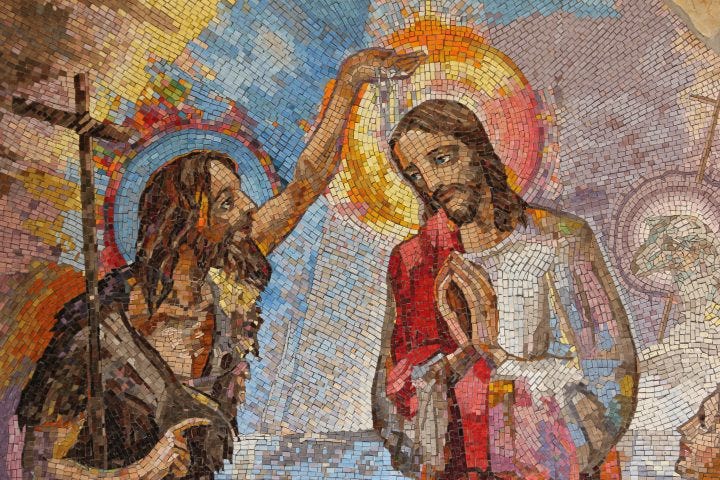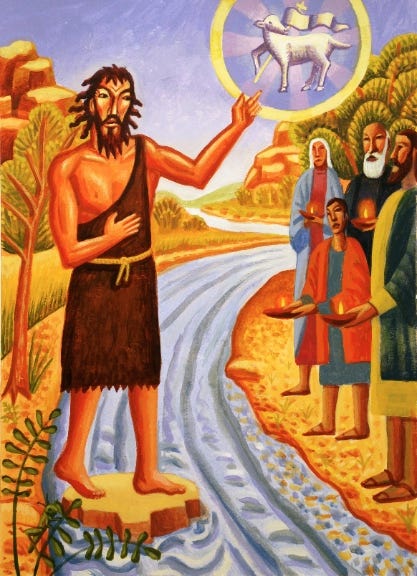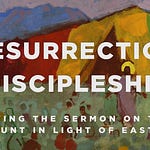John the Baptist continued to do what he had been doing since we last heard from him on the banks of the Jordan River. John called the people to repent, to turn away from their sins and back toward God, in preparation for the coming Kingdom of God.

“Repent, for the kingdom of heaven has come near,”[i] he said along the banks of the Jordan River.
“Repent, because the messiah has come.”
“Not only is God on the move, but God is here. So, be ready!”
No matter how you slice it, this is a difficult text to preach. The story of the beheading of John the Baptizer itself reads like it is a tragedy that seems to tragic too be real but then again, we live through similar headlines, it’s just that we have lived through them so many times we have become numb to many of the ongoing tragedy around us. I know quite a few preachers who chose a different scripture to preach from today when they read that the beheading of John the Baptist was the reading assigned for today. Through commentaries and seeing my colleagues choose readings like Ephesians 1, “In (Christ) you also, when you had heard the word of truth, the gospel of your salvation, and had believed in him, were marked with the seal of the promised Holy Spirit,”[ii] it is clear to me that many of us preachers do not know what to do with the beheading of John the Baptizer.
One reason preachers are unsure what to do with John is because John does the opposite of what we have been conditioned to do. Namely, point away from ourselves and toward someone else. When he called the Pharisees and Sadducees a "brood of vipers!”[iii] John was not calling attention to himself. He told the people, “I baptize you with water for repentance, but one who is more powerful than I is coming after me; I am not worthy to carry his sandals. He will baptize you with the Holy Spirit and fire.”[iv] Even as he baptized Jesus, a moment when John could have turned to the crowds and said, “See? I told you so,” John never drew attention toward himself.
So, when we read about John confronting Herod, we do not know what to do. That is when it becomes easy to focus on the politics of then and today, doing the exact opposite of what John did—focusing on ourselves rather than who and what John was proclaiming.
When John proclaimed that “the kingdom of heaven has come near,” [v] he was not talking about an abstract ideology. John meant that in Jesus Christ, the kingdom of heaven, the Kingdom of God, is present. Meaning that all of the work of the prophets, all of the longings of Israel and creation, were fulfilled and present in Christ. All the work of the church, all of the longings of the people of today and creation, have been fulfilled and are present in Christ.
John was not telling the people to repent because what they were doing was against the law, immoral, and setting a bad example. John’s critique of Herod is not about Herod’s politics or lust for power. John’s call to repentance was because the Kingdom of God was at hand. John was telling the people to get ready because Jesus was coming. Jesus is coming, Jesus is here, and he is reordering how we do what we do and renewing every corner of creation.
John the Baptist died while pointing to the Lamb who takes away the sins of the world, the One who died for his enemies, the One who offers forgiveness to us and those we could never imagine forgiving, the One who justifies the ungodly, the One who— even as he refuses to take up the sword, forgives those who betray him and crucify— says, “I have overcome the world.”
We, the church, Christ’s body, are the creation of that overcoming. And so, living with the full knowledge that the Kingdom of God is here, we pray for the people we thought of when we heard Herod's name read. We can pray that God would soften our hearts so that we would see the world as Christ sees it. We pray for the former President, the innocent bystanders, and even the shooter at yesterday’s campaign rally turned assassination attempt.
We advocate for peace among the nations, in our own nation, and in our homes. We advocate for the most vulnerable in our community. We work tirelessly to ensure that no one misses out on the grace of God.
But we cannot forget that Jesus was neither a teacher in the past nor a secretary of after-life affairs. He is Lord, ruling all things in heaven and on earth. Right now. So when it appears that the world, our nation, and our community are coming apart at the seams, we can recall the words of John, “The kingdom of heaven has come near.”[vi]
Without the gospel, the world would never know that there is an alternative to what the Herods of then and now are offering. Without the gospel, we are doomed to leaders looking out for themselves, politicians being shot for campaigning, and people who are indifferent because they cannot see that there is any other option than what is placed before them. But that is precisely what our resurrected Lord gives to the world.

Last night I, like many of you, was glued the news to see that the former President was shot during a campaign rally. I was quick to wonder what to say this morning. What would I say to you, knowing that many expect the church to have something to say in the face of political violence, in the face of any violence?
You see, in the face of violence, when confronting the consequences of our sin we return to the words of John the Baptist, “Repent, for the kingdom of heaven has come near.”[vii]
“Repent, because the messiah has conquered our Sin and Defeated our death.”
Christ has conquered the ways we cause harm to one another, creation, and ourselves.
Christ has defeated that which separates us from God and one another.
The church is the voice in the wilderness, calling for repentance and preparing the way for Jesus. We point to Christ in all things because our hope is that with Christ present in all things, everything is being made new. We have hope in the truth that, no matter how powerful the forces of this world may seem, Christ has already overcome, and his kingdom is here among us. Amen.
[i] Matthew 3:2
[ii] Ephesians 1:13
[iii] Matthew 3:7
[iv] Matthew 3:11
[v] Matthew 3:2
[vi] Matthew 3:2
[vii] Matthew 3:2
















Share this post